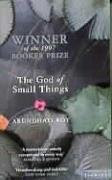The God of Small Things - Wendy's Review
Saturday, September 29, 2007 by Wendy
 he God of Loss. The God of Small Things. He left no footprints in sand, no ripples in water, no image in mirrors. -From The God of Small Things, page 250-
he God of Loss. The God of Small Things. He left no footprints in sand, no ripples in water, no image in mirrors. -From The God of Small Things, page 250-Arundhati Roy's first novel, The God Of Small Things, is a dazzling masterpiece of language. Roy constructs the story around one central theme: Things can change in a day. Set in a small town in the state of Kerala, India - the novel shifts back and forth from present day to the past - building to a sudden and terrible end with suspense drenched in original
language.
The novel centers around two twins - Rahel and Estha - and their mother, Ammu. Living with Ammu's extended family, the twins witness the unfolding of a drama which begins with the arrival of their young cousin from England, Sopie Mol. Relationships are gradually revealed, and the innocence of childhood becomes bared to the realities of adulthood. Although the reader is told the ending, this serves to create tension as Roy spirals backward and forward in time, constructing the pieces while uncovering the truth inch by inch. The reader's heart will bleed for little Estha with his pointy shoes and Elvis puff, who occupies "very little space in the world."
Roy explores the prohibition of love between castes, and the violence of the fledgling Communist movement - both topics which made this novel controversial in India.
The man standing in the shade of the rubber trees with coins of sunshine dancing on his body, holding her daughter in his arms, glanced up and caught Ammu's gaze. Centuries telescoped into one evanescent moment. History was wrong-footed, caught off guard. Sloughed off like an old snakeskin. Its marks, its scars, its wounds from old wars and the walking-backwards days all fell away. -From The God Of Small Things, page 168-
Despite its difficult subject matter (or maybe because of it), Roy won the prestigious Booker Prize in 1997 for this novel. With an artist's ability to construct scene, Roy immerses the reader in the novel:
She had forgotten just how damp the monsoon air in Ayemenem could be. Swollen cupboards creaked. Locked windows burst open. Books got soft and wavy between their covers. Strange insects appeared like ideas in the evenings and burned themselves on Baby Kochamma's dim forty-watt bulbs. In the daytime their crisp, incinerated corpses littered the floor and windowsills, and until Kochu Maria swept them away in her plastic dustpan, the air smelled of Something Burning. -From The God of Small Things, page 11-
Highly recommended; rated 5/5.
